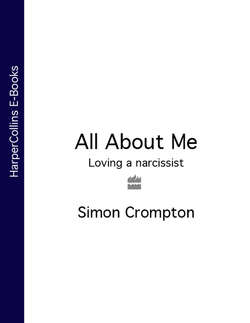Читать книгу All About Me: Loving a narcissist - Simon Crompton - Страница 15
PERSONALITY TYPES
ОглавлениеLet’s look at how you identify a narcissist from a slightly different angle: in terms of personalities. If you use the criteria from the American Psychiatric Association mentioned earlier, it’s easy to look at narcissism as some sort of illness, when in fact it’s a description of complex human characteristics. It’s just as useful to look at narcissism in terms of how our characters are formed. Because if we’re acknowledging that narcissism is an intrinsic part of the human make-up – a kind of primitive survival mechanism that gets adjusted and repressed as we subconsciously learn the necessity of fitting in with others and making partnerships – it’s fair enough to assume that some of us are bound to be more narcissistic than others.
This is what Freud believed, and the personality grouping that follows, based on his work, presents narcissism less as something problematic than as an intrinsic part of all human nature. Freud was one of the first thinkers on the human psyche to categorise our personalities into types. His early work on character types2 gave rise to the ‘anal character’. It’s a phrase that has stuck in popular parlance – people who are uptight and sticklers for detail are still referred to as ‘anal types’. But Freud’s character types go deeper than that, and reflect on how narcissism develops, and how it moulds our characters – ideas that were taken further by the psychoanalysts and psychologists that followed him.
It is in our childhood that our basic characters are moulded, and where the roots lie for many of the problems that people like Andrew and John exhibit. The earliest factors that determine a child’s eventual personality are obviously the genes that they are born with. But they are also determined by the way they are cared for and educated. Young children who are nurtured in different ways will end up with different characters. Children who live in a threatening environment and who have unsympathetic or emotionally absent parents are less likely to develop the kinds of resilient personalities that will help them cope with the challenges society throws at them as they grow up.
Freud categorised different stages of the child’s development, and different types of personality, according to what happened to children during these vital developmental states. He called these libidinal types. According to Freud, the libido is a type of instinctive energy that all human beings have when they are born – a type of life force, if you like. This goes through various phases as we mature, determining people’s personalities as it develops. According to what happened during childhood, people are either more or less likely to develop the attributes of certain libidinal types – either getting stuck at one point in the libido’s development, or moving on to the next.3
Freud came up with three libidinal types, or personality groups. Each group, as a result of their upbringing, has a very different reaction to the ‘socialising’ forces we encounter as we grow up. None of us should look to conform too neatly to these types, but they do usefully reflect the fact that we all respond to situations of stress, love and society quite differently. There have been other groupings of personality type put together by psychologists, but Freud’s categories neatly capture some of the most distinctive traits of narcissists.
So here are the three types, with some of the characteristics Freud attributed to them. Below each are ten key questions, which may help you pinpoint which one applies to you or your partner. Tick each point that applies to you, or to the person you are answering on behalf of.
The erotic
This group is highly focused on love: loving, but more importantly being loved, is the most important thing in their life. They are governed by the dread of loss of love, which makes them very dependent on those who may withhold love from them.
Do you value friends and family, and depend on them to provide security?
Do you tend to bring people together?
Do you find being on your own hard?
Do you think you sometimes show your emotions too much?
Do you sometimes think you are too trusting?
Do you fear conflict?
Do you try to encourage others to collaborate?
Do you hate the idea of people not liking you?
Do you find it hard to make tough decisions?
The obsessional
Rather than being dependent on the people around them, as erotics are, people in this group are very self-reliant, and are guided by worries about what might be the right thing to do. They are naturally conservative, sticklers for detail, and upholders of existing institutions rather than innovators.
Do you set yourself high ideals that you try to live up to?
Are you diligent?
Are you a stickler for timekeeping?
Are you obsessive about tidiness?
Are you choosy about your friends, but tend to be loyal?
Do you set about completing tasks in a very systematic way?
Are you resistant to change?
Do you get upset if things are not done the right way?
Are you judgemental?
The narcissistic
Love is not a prime influence for members of this group – their main interest is self-preservation. Narcissists are independent and not easily overawed. They can strike others as being ‘personalities’ and often want to change things radically.
Do you only trust your own opinions?
Do you sometimes think the world is conspiring against you?
Do you think people are either for you or against you?
Are you competitive?
Do you voraciously want to learn things?
Are you very sensitive to criticism?
Do you tend not to listen to others?
Do you tend to exaggerate?
Do others find you a bit grandiose?
Do you have a strong vision of how things should be, and want to change everything to fit?
